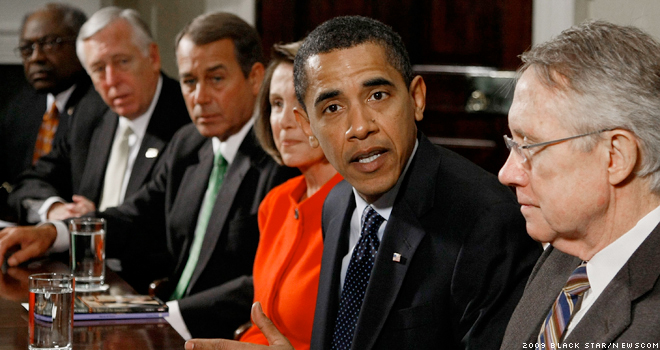In a prime time address to the nation Monday evening, President Obama urged Americans to call their members of Congress, to pull Republicans back from a dangerous ledge, and bring them on board with new Democratic legislation that would cut spending significantly and avoid a catastrophic debt default. But the dynamic on Capitol Hill is already taking shape, and what Obama said is not likely to dislodge party leaders from their current strategies.
Discussions with senior Congressional aides, and Democratic and Republican Senators suggests leaders of both parties are hoping to avoid a public showdown between the House and Senate as the country careens toward default.
“Don’t jump to conclusions — there’s still discussions going on,” Senate Minority Whip Jon Kyl (R-AZ) told reporters in the Capitol late Monday. “It would be ideal if we didn’t have both chambers ultimately taking votes on their proposal, getting their members more locked down. If we could reach an agreement before there is a vote, that would be a good thing.”
He, along with Senate Majority Whip Dick Durbin (D-IL) and Sen. Rob Portman (R-OH), confirmed that high-level negotiations to make sure the debt limit can be raised by August 2 on a bipartisan basis continue, even though publicly Democrats and Republicans remain deeply divided.
“All of the leadership is committed to getting all that has to be done done…and there are good faith discussions going on about how to do it,” Kyl said.
But what happens if they don’t reach detente? Then the parties will have to work out a solution on the floors of the House and Senate, where each party is now consolidating votes to prevent either of the plans currently under consideration from passing.
Senate Democrats and Republicans met separately with their caucuses late Monday to discuss those plans — one authored by Senate Majority Leader Harry Reid (D-NV), the other by House Speaker John Boehner (R-OH) — each of which would avoid a debt default next month, neither of which has bipartisan support at the moment.
When those meetings ended, Republicans said a key sticking point with Reid’s plan is that it counts expected reduced war spending toward deficit reduction — even though the Iraq and Afghanistan wars are scheduled to wind down already.
“Unless I’m missing something, that leads me to a conclusion that I’d be a no vote,” said Sen. Mike Johanns (R-NE).
If there was a debate in the GOP meeting, said Sen. John Cornyn (R-TX), it was about whether Reid’s plan is “just smoke and mirrors or whether it was blue smoke and mirrors. It’s not a real proposal.”
At a glance, that suggests neither plan will be able to overcome a filibuster — that a negotiated compromise is the only way out of the mess. But not so fast.
If and how Congress raises the debt limit now depends to a large extent on the outcome of a complicated legislative chess game, which began Monday evening before Obama’s speech. Leaders in both parties are thinking moves ahead, hoping to squeeze their preferred plan through the House and Senate on or before August 2.
On Monday, Reid chose black. He decided to sit on his own plan for at least a day, and let Boehner make the first move — to bring his plan up for a House vote on Wednesday. A great deal hinges on whether Boehner’s plan can pass, and Democrats won’t be providing much if any help. A spokesperson for House Democratic Whip Steny Hoyer (D-MD) tells me Democrats will be whipping against the bill, and both Hoyer and House Minority Leader Nancy Pelosi (D-CA), at a private caucus meeting Monday, urged Democrats to unite against Boehner on the House floor this week. That means a sizable bloc of House conservatives could kill it — and they very well may. If they do, Reid’s plan might just become more appealing to Senate Republicans than it is right now — the only way to avoid default.
But even if Boehner’s plan passes in the House it will be set up to fail in the Senate, and Reid would likely prove that by expediting a vote on it. The question then is whether Democrats would try to jam Republicans with Reid’s plan on the threat of default, or merge the plans in some ways.
“I think it will be demonstrated clearly at the end of the week that the Boehner approach is not going to pass the Senate,” Durbin told reporters in the Capitol Monday. “And then the question is whether the senators, Democrats and Republicans, can come up with a reasonable, moderate approach to solving this problem…. We’re going to pass ours, that’s our goal.”
That would leave Democrats two options: the first, dare Republicans to vote their plan down and risk a default — what one top Democratic aide called the “last plan standing” strategy. The other would be to figure out a way to meld the Boehner and Reid plans — one that guarantees that the country’s borrowing authority won’t run out before 2012, but perhaps includes additional failsafes to assure that Congress passes entitlement and tax reforms in the months ahead.
That’s the “draw” scenario — and it’s possible that members will become more amenable to such a solution after the parties prove their resolve in a handful of failed votes, and the credit markets begin to truly rebel.
So there are many, many plausible outcomes here. We’ll be able to eliminate some of them in the days ahead.










